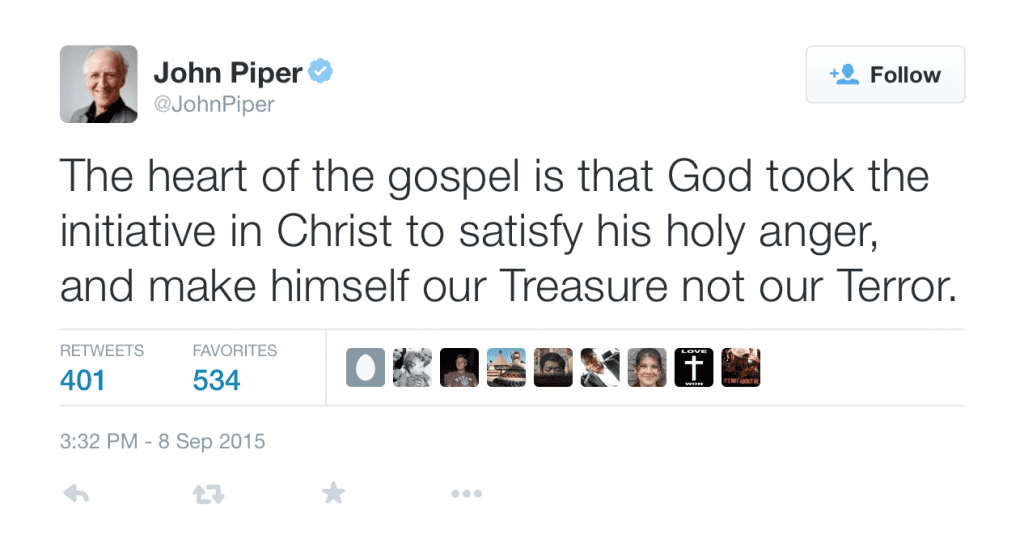Last week, notorious prosperity gospel huckster, Creflo Dollar sent out this, uh, less than orthodox message on Twitter (as well as on his Facebook page).
Somewhat surprisingly, the unabashed prophet of sanctified materialism deleted his obscenely heretical proclamation later in the day. I say somewhat surprisingly because there wasn’t really anything shocking about what he said given that it was coming from him. After all, it was the same gospel he’s been proclaiming for years simply reduced to 140 characters of less.
Though Creflo’s version of the gospel is vomit inducing to most Christians, it got me to thinking.
What is the gospel anyway?
Maybe that sounds like a dumb question to you or at least a cliché question with an obvious answer, but hear me out because I’m not sure there’s as much consensus on the gospel as some of us might assume.
Creflo’s self-serving gospel is obviously not what most of us would affirm as the true gospel. Sure, it’s good news for him, but if we can’t “lay claim to the promise of financial prosperity” that Jesus supposedly bled and died for – and most of us can’t – then the logical implication is that the poor (and maybe the debt riddled middle class too) are doomed to hell.
That’s not really great news, much less good news.
But Creflo isn’t the only one with a version of the gospel whose news doesn’t sound quite so good.
Take his far more orthodox counterpart John Piper’s version of the gospel, for example.
While his many, if not most, of his fellow diehard Calvinists no doubt would rejoice at Piper’s digital proclamation, countless other Christians – myself included – cringe at the idea that at its heart, the gospel is about anger and fear (and God’s apparent bloodlust), rather than love and embrace.
Personally, I fail to see what’s so good about news that is fundamentally driven by terror and wrath and death. Obviously, Mr. Piper disagrees.
At the other end of the theological spectrum, there is the über liberal version of the gospel famously caricatured by H. Richard Niebuhr…
A God without wrath brought men without sin into a Kingdom without judgment through the ministrations of a Christ without a Cross.
Though I certainly have liberal/progressive affinities myself, this version of the gospel is not one I embrace. As I said before, it’s a caricatured version of liberal theology. That said, in some ways – particularly the “men without sin into a Kingdom without judgment” bit – it does capture a form of the gospel that is embraced by many Christians reacting against the turn or burn, wrath filled theology of folks like John Piper.
But, personally, I’m not sure where the good news is to be found in a God who would rather hold hands and sing a rousing chorus of “I’m ok, you’re ok, we’re all ok, so let’s celebrate!” than actually do something to change, transform, and redeem a world that is so very clearly not ok.
So maybe the real gospel is found somewhere in the “middle?”
Maybe if we lose the dogmatic wrath of Calvinism, avoid too much of the warm fuzziness Niebuhr complained about, and just go with good old fashioned generic evangelicalism we’ll find the true gospel?
After all, the Greek work for gospel is right there in the name. Maybe evangelicalism’s focus on simply affirming that Jesus came, died, and rose again for the forgiveness our sins and that believing in that truth with your whole heart will save you from hell is the gospel?
Maybe.
But I’m not convinced.
Don’t get me wrong. I think the message that God came to earth in the form of Jesus, was crucified, died, and was raised from the dead is absolutely central to the gospel…but I’m not sure it’s the entire gospel.
Let me explain before you tie me to the stake and strike the match.
To me, there are at least 4 problems with the gospel as simply an idea to affirm.
First off, simply believing that Jesus is God, that he died, and was raised for the forgiveness of our sins, while certainly a great thing to affirm, is something even the demons believe. So, I’m not sure how much credit we actually get for agreeing that the central claim of evangelicalism is true.
Which leads us to a second problem. That sort of reductionism of the gospel into a matter of intellectual assent, turns the good news into little more than a sales pitch and salvation itself into a strange brew of gnosticism and witchcraft: have the right knowledge, believe the right things, say the magic words, and, violà, your salvation is secured.
This leads to yet another problem. This sort of salvation by intellectual assent mixed with the fixation on the end times that is so endemic to so much of evangelicalism creates a gospel that is almost exclusively focused on the next life. Sure, eternal life is good news, even great news, but for the poor and the dying, the marginalized and the oppressed, a gospel that doesn’t speak to or affect this life, but instead essentially tells the suffering to “deal with it” or “it’s not that big of a deal because heaven!” isn’t such great news. It’s barely even good news.
And it leads us to the fourth problem with the version of the gospel many of us accept as the gospel.
As much as we like to proclaim salvation by faith alone – that is by simply declaring our belief in Jesus as Lord and Savior we’ll avoid going to hell – Jesus himself doesn’t seem to be quite as on board with this most hallowed of Protestant dogmas as we are. In Matthew’s gospel, he tells us…
Not everyone who says to me, ‘Lord, Lord,’ will enter the kingdom of heaven, but only the one who does the will of my Father who is in heaven.
It’s a sentiment echoed by James…
What good is it, my brothers and sisters, if you say you have faith but do not have works? Can faith save you? If a brother or sister is naked and lacks daily food, and one of you says to them, “Go in peace; keep warm and eat your fill,” and yet you do not supply their bodily needs, what is the good of that? So faith by itself, if it has no works, is dead.
Now, neither James nor Jesus are claiming that saying “Lord, Lord” is worthless, but clearly for both of them there is more to the gospel than simply an affirmation of belief in a particular idea – even if Jesus is at the center of that idea.
For Jesus, the gospel has to be more than just an idea to agree to, more than just a sales pitch to sell to potential converts. After all, sales pitches aren’t nearly powerful enough to answer audacious prayers like “Thy kingdom come, Thy will be done, on earth as it is in heaven.”
So all of this got me to thinking.
Maybe I’m asking the wrong question.
Maybe the question isn’t “What is the gospel?”
Maybe the better question is “Who is the gospel?”
In other words, maybe the gospel isn’t as much an idea as it is a person. After all, even when our version of the gospel is an idea to agree to, it’s still an idea based on the life of a particular person – Jesus.
I don’t mean to imply that the things he said aren’t part of the gospel. They absolutely are. But Jesus went out of his way to demonstrate time and time and time again that you can’t separate his teachings from his particular way of life. Or to put it another way, he didn’t just proclaim the gospel.
He was the gospel.
He is the gospel.
Jesus is the good news because it is in and through Jesus – not his disembodied ideas – that the world and everyone and everything in it is being made new.
Now, I know that arguing that Jesus is the gospel may sound like a cliché Jesus juke of the title of this post, and obviously, we won’t all agree on exactly what the incarnation of Jesus as the gospel looks like in each of our lives. But Jesus as the gospel – rather than simply an idea as the gospel – is an important and critical starting point for preventing the sort of shallow, self-serving versions of the supposedly good news that are too often nothing more than words that have no affect on the here and now lives of those who hear us preach (except to tie up heavy burdens, hard to bear, and lay them on their shoulders).
Jesus as the gospel speaks to the width and breath of the gospel’s implications for both this life and the next. It certainly maintains the promise of eternal life, but it does so by following in the footsteps (and teaching) of Jesus and demanding incarnation and change in this life, rather than myopically focusing on life after death.
For Jesus, the good news is that the Kingdom of God is already at hand. It’s not simply some distant hope just over the horizon. It’s a present reality that began unfolding in him and continues to unfold in the life of the faithful through the transforming power of the Holy Spirit.
Which is why, for Jesus, it’s not just “repent!” It’s “repent for the Kingdom of God is at hand!” For Jesus, the gospel isn’t just about getting people to say the Sinner’s Prayer and agree to list of beliefs. It’s also about ushering in the Kingdom of God on earth as it is heaven
Too often in the Church today, our focus is almost exclusively on the repenting part of Jesus’ gospel. After all, we argue, in light of eternity, the problems of this life aren’t that important.
But Jesus didn’t agree with our reductionist version of the gospel.
All of those things that we have reduced to secondary importance: feeding the hungry, caring for the poor, pursing peace, loving enemies, etc., are every bit as important to Jesus as the call to repent. In fact, the very call to repent implies as much itself for the call to repent is a call to turn away from a self-serving life in the model of Adam and start living an others-serving sort of life in the model of the new Adam.
This doesn’t mean we don’t preach the words of the gospel. We do. But if Jesus is the gospel and Jesus is all about transforming and redeeming the world by bringing the Kingdom of God to earth as it is in heaven, then if we’re not part of that work, we’re not actually proclaiming the whole gospel. Remember: the Great Commission isn’t just a call to teach. It’s also a call to obey.
Therefore, our best proclamation of the gospel comes when we’re also just as passionate about feeding the hungry, clothing the naked, caring for the sick, and visiting those in prison as we are preaching the gospel from behind a pulpit.
When we do that, we fulfill the greatest commandment. When we do that, we really, truly, and fully proclaim the good news.
So what does Jesus as the gospel actually look like?
Jesus as the gospel means instead of standing on a street corner shouting damnation at strangers, we’re standing side by side with our oppressed brothers and sisters.
Jesus as the gospel means handing out religious tracts is worthless if we aren’t seeking to make peace with our enemies and striving to care for the poor.
Jesus as the gospel means less hand-wringing over dogmatic purity and more welcoming of the outcast.
Jesus as the gospel means we preach the good news at all times and when necessary use words.
The gospel of Jesus is embodied, lived out good news for all, not just an idea for you and me to agree to. Yes, the gospel is a message we can and should preach from behind a pulpit or wherever we have the chance, but if the gospel we proclaim is just words, if it’s just a sales pitch to “win converts and save souls,” then our gospel is half empty.
Jesus is the good news.
And he’s the good news because the Kingdom of God had and is and one day will fully dawn through him.
The good news isn’t that we’re going to be zapped away some day to some place else or that all that matters is the next life.
The good news is that all things are being made new now through the life, death, and resurrection of Jesus.
If this good news isn’t incarnated in our own lives, if we’re not living out the gospel by participating daily in the inbreaking work of the Kingdom of God, if we’re not embodying Jesus to neighbor and foe alike, then no matter how eloquent or theologically astute our preaching may be, our gospel will never truly be good news.

 (
(












